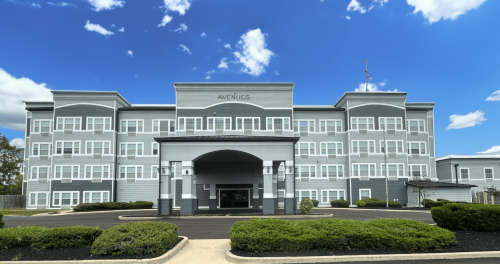
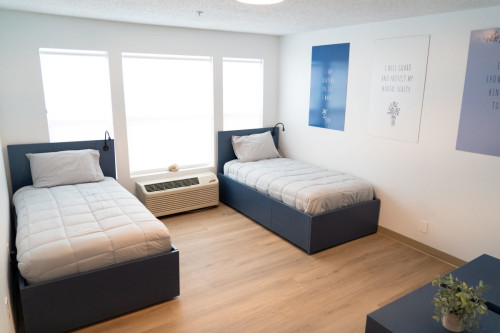
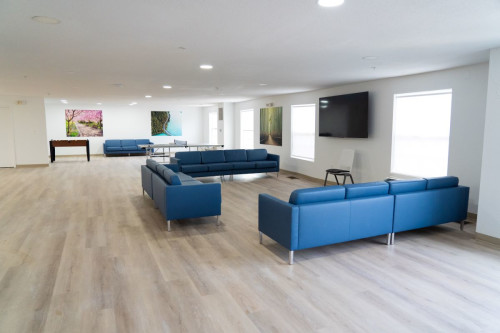






Avenues Recovery Center at Indianapolis
Verified Center
This provider's information has been quality-checked by Recovery.com's Research Team for accuracy and completeness, including center verification through appropriate third-party organizations.
Treatment Focus
This center treats substance use disorders and co-occurring mental health conditions. Your treatment plan addresses each condition at once with personalized, compassionate care for comprehensive healing.
Primary Level of Care
Offering intensive care with 24/7 monitoring, residential treatment is typically 30 days and can cover multiple levels of care. Length can range from 14 to 90 days typically.
Treatment Focus
This center treats substance use disorders and co-occurring mental health conditions. Your treatment plan addresses each condition at once with personalized, compassionate care for comprehensive healing.
Primary Level of Care
Offering intensive care with 24/7 monitoring, residential treatment is typically 30 days and can cover multiple levels of care. Length can range from 14 to 90 days typically.
Provider's Policy
We believe financial barriers shouldn't stop healing. Avenues Recovery Center is in-network with major providers and accepts most insurance plans and private pay. Our expert admissions team will conduct a free, confidential verification of benefits to maximize your coverage and ensure a sustainable and affordable treatment plan. Call us—we'll answer all your questions.
Avenues Recovery Center at Indianapolis
Avenues Recovery Center at Indianapolis
About Avenues Recovery Center at Indianapolis
Whether it is someone’s first try at rehab or their tenth, Avenues Recovery Center at Indianapolis offers top-tier treatment and a community that cares. They provide a full continuum of care spanning detox, residential, day treatment (PHP), intensive outpatient (IOP), and outpatient programming, as well as medication-assisted treatment (MAT) and a close-knit alumni program. They work with all insurance plans and Medicaid to ensure that healing is affordable for everyone, and offer extended care options for as long as each client needs.
Heal on Every Level
At the core of Avenues’ treatment philosophy is the belief that each person’s recovery journey is unique. Their clinicians create individualized treatment plans, choosing from a variety of targeted, tried-and-true treatment modalities to deliver the most effective treatment experience. Days are filled with a challenging yet energizing mix of individual therapy, group sessions, educational workshops, skill-building, and recovery-focused recreational activities, as you expand your recovery toolbox and develop effective coping techniques.
Experience Peaceful, Communal Living
At Avenues’ residential treatment center, every effort is made to ensure the client is well cared for, well nourished, and in a peaceful environment supporting recovery. Clients live in a pleasant, communal-style building with round-the-clock medical supervision. They share a bedroom and bathroom with one or two other people. Three meals and snacks are served daily, and clients have time to relax and socialize with fellow attendees. If someone has no way of getting to the facility, Avenues arranges safe transportation.
Plan to Make Sobriety Stick Post-Treatment
At Avenues, aftercare/discharge planning begins at intake. Throughout a client’s stay, the treatment and case management teams work together to create a realistic, sustainable aftercare plan that will help the client stay strong in their sobriety for years to come. Every client is set up with a primary care physician, therapist, housing (if necessary) and local support group before they are discharged.

Highlights from the Center
Highlights
These highlights are provided by and paid for by the center.
Medically Assisted Detox
Certified Professionals
Master's Level Therapists
Addiction Recovery
Center Overview
Treatment Focus
This center treats substance use disorders and co-occurring mental health conditions. Your treatment plan addresses each condition at once with personalized, compassionate care for comprehensive healing.
Joint Commission Accredited
The Joint Commission accreditation is a voluntary, objective process that evaluates and accredits healthcare organizations (like treatment centers) based on performance standards designed to improve quality and safety for patients. To be accredited means the treatment center has been found to meet the Commission's standards for quality and safety in patient care.

Avenues Recovery Center at Indianapolis
Insurance Accepted
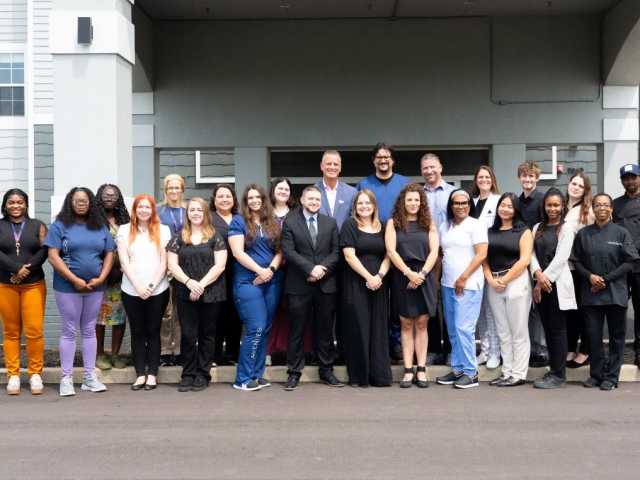

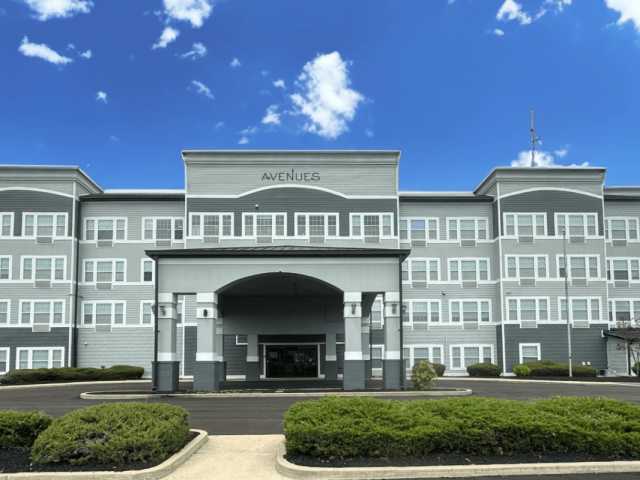
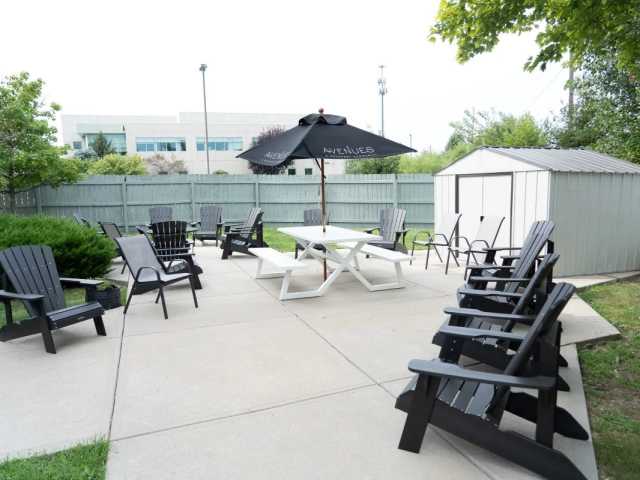
More Avenues Recovery Center Locations
Recovery.com Verified Listing
Recovery.com verified that the name, location, contact information and license to operate for this treatment provider are valid and up-to-date.

Licensed by Indiana

Joint Commission Accredited
Recovery.com is an independent, third-party mental health resource. Verification does not imply endorsement and does not guarantee the quality of treatment services.
Meet Your Care Team

Eric Bickel
Administrator
Your Care Options
Specializations
Holistic
A non-medicinal, wellness-focused approach that aims to align the mind, body, and spirit for deep and lasting healing.
Medication-Assisted Treatment
Combined with behavioral therapy, prescribed medications can enhance treatment by relieving withdrawal symptoms and focus patients on their recovery.
Motivational Interviewing
Based on the idea that motivation to change comes from within, providers use a conversational framework to discover personalized methods for change.
Detox
Detox fully and safely removes toxic substances from the body, allowing the next steps in treatment to begin with a clean slate.
Alcohol
Using alcohol as a coping mechanism, or drinking excessively throughout the week, signals an alcohol use disorder.
Who We Treat
Pregnant Women
Addiction and mental health treatment meets the clinical and psychological needs of pregnant women, ensuring they receive optimal care in all areas.
Treatment Services
Residential
In a residential rehab program, patients live onsite, with access to daily treatment and 24-hour care. An average stay is 30-90 days.
Outpatient
During outpatient rehab, patients attend a structured treatment program while continuing to live at home.
Day Treatment
In a PHP, patients live at home but follow an intensive schedule of treatment. Most programs require you to be on-site for about 40 hours per week.
Intensive Outpatient Program
In an IOP, patients live at home or a sober living, but attend treatment typically 9-15 hours a week. Most programs include talk therapy, support groups, and other methods.
Detox
Detox fully and safely removes toxic substances from the body, allowing the next steps in treatment to begin with a clean slate.
Approaches
Twelve Step
Incorporating spirituality, community, and responsibility, 12-Step philosophies prioritize the guidance of a Higher Power and a continuation of 12-Step practices.
Medical
Medical addiction treatment uses approved medications to manage withdrawals and cravings, and to treat contributing mental health conditions.
Holistic
A non-medicinal, wellness-focused approach that aims to align the mind, body, and spirit for deep and lasting healing.
Evidence-Based
A combination of scientifically rooted therapies and treatments make up evidence-based care, defined by their measured and proven results.
Therapies
1-on-1 Counseling
Patient and therapist meet 1-on-1 to work through difficult emotions and behavioral challenges in a personal, private setting.
Family Therapy
Family therapy addresses group dynamics within a family system, with a focus on improving communication and interrupting unhealthy relationship patterns.
Twelve Step Facilitation
12-Step groups offer a framework for addiction recovery. Members commit to a higher power, recognize their issues, and support each other in the healing process.
Psychoeducation
This method combines treatment with education, teaching patients about different paths toward recovery. This empowers them to make more effective decisions.
Art Therapy
Visual art invites patients to examine the emotions within their work, focusing on the process of creativity and its gentle therapeutic power.
Meditation & Mindfulness
A practiced state of mind that brings patients to the present. It allows them to become fully aware of themselves, their feelings, and the present moment.
Substances We Treat
Cocaine
Cocaine is a stimulant with euphoric effects. Agitation, muscle ticks, psychosis, and heart issues are common symptoms of cocaine abuse.
Prescription Drugs
It's possible to abuse any drug, even prescribed ones. If you crave a medication, or regularly take it more than directed, you may have an addiction.
Benzodiazepines
Benzodiazepines are prescribed to treat anxiety and sleep issues. They are highly habit forming, and their abuse can cause mood changes and poor judgement.
Ecstasy
Ecstasy is a stimulant that causes intense euphoria and heightened awareness. Abuse of this drug can trigger depression, insomnia, and memory problems.
Co-Occurring Disorders
A person with multiple mental health diagnoses, such as addiction and depression, has co-occurring disorders also called dual diagnosis.
Psychedelics
Hallucinogenic drugs—like LSD—cause euphoria and increased sensory experiences. When abused, they can lead to depression and psychosis.
Drug Addiction
Drug addiction is the excessive and repetitive use of substances, despite harmful consequences to a person's life, health, and relationships.
Heroin
Heroin is a highly addictive and illegal opioid. It can cause insomnia, collapsed veins, heart issues, and additional mental health issues.
Synthetic Drugs
Synthetic drugs are made in a lab, unlike plant-based drugs like mushrooms. Most synthetic drugs are either stimulants or synthetic cannabinoids.
Languages
Aftercare
Care Designed for Your Needs
Personal Amenities

Learn More About the Center
Life After Rehab: A Guide to Enjoyable Sober Activities
Discover 10 ways to enjoy life in sobriety with uplifting, connection-building activities.
What Recovery Really Looks Like
Explore an honest look at recovery that highlights hope, growth, and real-life transformation.
What We Wish Our Families Knew About Addiction
Gain heartfelt insight into what loved ones often miss about addiction and the healing journey.
Why “Just Stop” Isn’t So Simple
Learn about the science of making choices and why recovery takes more than willpower.
What people are saying
Treatment
4.8
Accommodations
4.9
Food & Nutrition
4.3
Value
4.7
Pros
- Excellent & Effective Treatment Programming (6)
- Friendly & Competent Staff (6)
- Addressed Trauma (3)
- Fun Activities (3)
Stephanie C.
Treatment in 2026 • (30 days) • Reviewed 01/15/26
Former Client
•cna hha
Billy Turner
(30 days) • Reviewed 01/20/26
Former Client
Ted Tobias
Treatment in 2025 • (30 days) • Reviewed 01/13/26
Former Client
•Retired
•Grant county in.
Joshua B.
Treatment in 2025 • (28 days) • Reviewed 01/10/26
Former Client
•Jeffersonville, IN
ronnie skipper
Treatment in 2025 • (30 days) • Reviewed 01/10/26
Loved One of a Former Client





